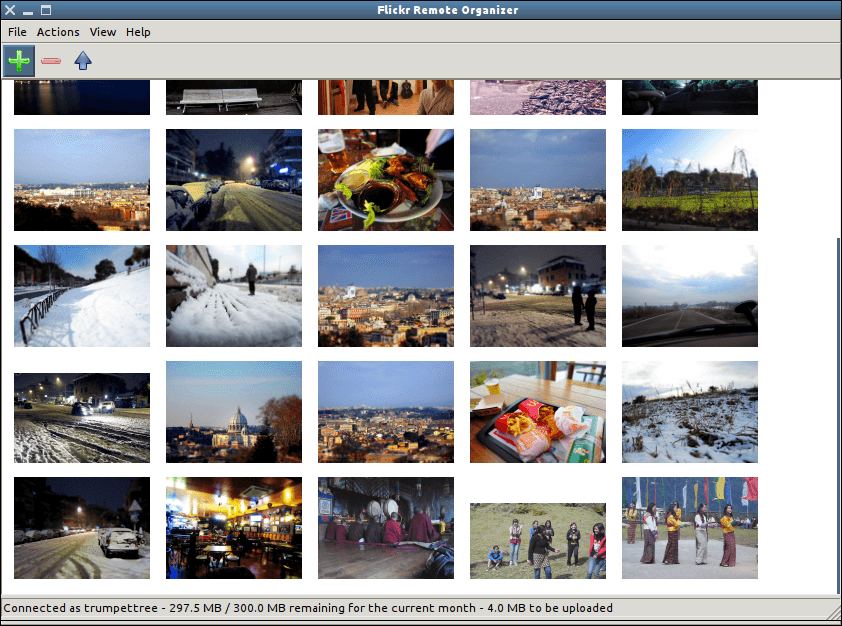Flickr Remote Organizer (Frogr) is a small open source application for the GNOME desktop that allows users to manage their accounts in the Flickr image hosting website. It supports all the basic Flickr features, including uploading pictures, adding descriptions, setting tags and managing sets and groups pools.
Frogr intends to be a complete GNOME application to remotely manage a Flickr account from the desktop.
Frogr uses flicksoup, a libsoup-based library to communicate with the server through the publicly available flickr REST API.
Features include:
- Allow to upload pictures and videos to flickr, specifying details such as title, description, tags, visibility, content type, safety level and whether the to “show up on global search results”, both individually or to several elements at once.
- Allow uploading pictures and videos located in remote machines, through typically supported protocols (SAMBA, SSH, FTP…).
- Allow loading/saving the work session from/to ‘project’ files.
- Allow sorting pictures and videos by title, size and date taken, besides the default order (“as loaded”).
- Allow adding tags to elements, opposite to just set them through the ‘details’ dialog.
- Allow setting specific licenses and geolocation information for pictures right from the desktop.
- Allow specifying sets and group pools for the elements to be added to after the upload process.
- Allow to create sets right from frogr, opposite to just adding elements to already existing ones.
- Allow specifying a list of pictures and/or videos to be loaded from command line.
- Import tags from picture’s metainformation if present when loading.
- Open pictures and videos from frogr in the default image viewer, both from the details dialog and the main view.
- Auto-completion in ‘tags’ entries, based in tags already present for the active account.
- Registered as image mime types handler, so it’s possible to load stuff on it from other applications (e.g. nautilus or eog).
- Support for drag’n’drop to load elements right from other apps.
- Support for handling multiple Flickr accounts.
- Support for internationalization (i18n) messages.
- Support for specifying HTTP proxies manually.
- Support for using the GNOME general proxy settings.
- Support for the new OAuth-based authentication system. Previous versions of frogr using the old system will be seamlessly updated.
- Integrated with GNOME.
- Manual translated into Czech, German, English, Spanish, French, Russian, and Slovenian.
- Translated to Czech, Danish, German, Greek, English, Spanish, French, Galician, Italian, Polish, Brazilian Portuguese, Russian, Slovenian, Swedish, Turkish, Ukrainian, and Chinese.
Website: wiki.gnome.org/Apps/Frogr
Support: GitLab Code Repository
Developer: Mario Sanchez Prada
License: GNU General Public License v3.0

Frogr is written in C. Learn C with our recommended free books and free tutorials.
| Popular series | |
|---|---|
| The largest compilation of the best free and open source software in the universe. Each article is supplied with a legendary ratings chart helping you to make informed decisions. | |
| Hundreds of in-depth reviews offering our unbiased and expert opinion on software. We offer helpful and impartial information. | |
| The Big List of Active Linux Distros is a large compilation of actively developed Linux distributions. | |
| Replace proprietary software with open source alternatives: Google, Microsoft, Apple, Adobe, IBM, Autodesk, Oracle, Atlassian, Corel, Cisco, Intuit, and SAS. | |
| Awesome Free Linux Games Tools showcases a series of tools that making gaming on Linux a more pleasurable experience. This is a new series. | |
| Machine Learning explores practical applications of machine learning and deep learning from a Linux perspective. We've written reviews of more than 40 self-hosted apps. All are free and open source. | |
| New to Linux? Read our Linux for Starters series. We start right at the basics and teach you everything you need to know to get started with Linux. | |
| Alternatives to popular CLI tools showcases essential tools that are modern replacements for core Linux utilities. | |
| Essential Linux system tools focuses on small, indispensable utilities, useful for system administrators as well as regular users. | |
| Linux utilities to maximise your productivity. Small, indispensable tools, useful for anyone running a Linux machine. | |
| Surveys popular streaming services from a Linux perspective: Amazon Music Unlimited, Myuzi, Spotify, Deezer, Tidal. | |
| Saving Money with Linux looks at how you can reduce your energy bills running Linux. | |
| Home computers became commonplace in the 1980s. Emulate home computers including the Commodore 64, Amiga, Atari ST, ZX81, Amstrad CPC, and ZX Spectrum. | |
| Now and Then examines how promising open source software fared over the years. It can be a bumpy ride. | |
| Linux at Home looks at a range of home activities where Linux can play its part, making the most of our time at home, keeping active and engaged. | |
| Linux Candy reveals the lighter side of Linux. Have some fun and escape from the daily drudgery. | |
| Getting Started with Docker helps you master Docker, a set of platform as a service products that delivers software in packages called containers. | |
| Best Free Android Apps. We showcase free Android apps that are definitely worth downloading. There's a strict eligibility criteria for inclusion in this series. | |
| These best free books accelerate your learning of every programming language. Learn a new language today! | |
| These free tutorials offer the perfect tonic to our free programming books series. | |
| Linux Around The World showcases usergroups that are relevant to Linux enthusiasts. Great ways to meet up with fellow enthusiasts. | |
| Stars and Stripes is an occasional series looking at the impact of Linux in the USA. | |